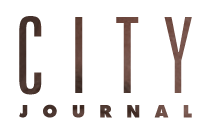John Tierney
Supposedly engaged in a struggle against misinformation, Facebook and its fact-checking partner spread their own.

At the end of a recent 800-meter race in Oregon, a high school runner named Maggie Williams got dizzy, passed out, and landed face-first just beyond the finish line. She and her coach blamed her collapse on a deficit of oxygen due to the mask she’d been forced to wear, and state officials responded to the public outcry by easing their requirements for masks during athletic events. But long before the pandemic began, scientists had repeatedly found that wearing a mask could lead to oxygen deprivation. Why had this risk been ignored?
One reason is that a new breed of censors has been stifling scientific debate about masks on social media platforms. When Scott Atlas, a member of the White House’s coronavirus task force, questioned the efficacy of masks last year, Twitter removed his tweet. When eminent scientists from Stanford and Harvard recently told Florida governor Ron DeSantis that children should not be forced to wear masks, YouTube removed their video discussion from its platform. These acts of censorship were widely denounced, but the social media science police remain undeterred, as I discovered when I recently wrote about the harms to children from wearing masks.
Facebook promptly slapped a label on the article: “Partly False Information. Checked by independent fact-checkers.” City Journal appealed the ruling, a process that turned out to be both futile and revealing. Facebook refused to remove the label, which still appears whenever the article is shared, but at least we got an inside look at the tactics that social media companies and progressive groups use to distort science and public policy.
The “independent fact-checkers” of my article are affiliated with a nonprofit group called Science Feedback, which has partnered with Facebook in what it calls a “fight against misinformation.” The group describes itself as “nonpartisan,” a claim that I would label “Mostly False” after studying dozens of its fact-checks enforcing progressive orthodoxy on climate change and public health. I didn’t see anything that would have displeased the journalists and officials promoting lockdowns and mask mandates. Nor did I see anything that would have displeased a Democrat, particularly during the last presidential campaign. In October, when Donald Trump was predicting that a vaccine was imminent, the group labeled that prediction “Inaccurate” and proclaimed that “widespread Covid-19 vaccination is not expected before mid-2021.” (Fact check: The vaccine rollout began in December.)
My article was flagged because it cited a study by a team of researchers in Germany who established an online registry for thousands of parents to report on the impact of masks on their children. More than half of those who responded said that masks were giving their children headaches and making it difficult for them to concentrate. More than a third cited other problems, including malaise, impaired learning, drowsiness, and fatigue.
The study passed peer review at a medical journal, Monthly Pediatrics, but it didn’t satisfy Facebook’s fact-checkers. Science Feedback labeled the study “Unsupported” on the grounds that it “cannot demonstrate a causal relationship between mask-wearing and these effects in children, due to limitations in its design.” The critique listed various limitations: the parents who responded to the registry were a self-selected sample; the parents couldn’t be sure if their children’s problems were due to masks or to something else; there was no control group of children who didn’t wear masks.
This is the same tactic used by the tobacco industry last century when epidemiologists observed high rates of lung cancer among people who reported a history of heavy smoking. The industry harped on the limitations of the studies—like their reliance on people’s self-reported history of smoking—and insisted that there was no proof that smoking caused cancer because no one had done a sufficiently rigorous controlled study.
Any study can be faulted for methodological shortcomings, but that doesn’t mean its results should be ignored or suppressed, particularly when the findings are consistent with a large body of evidence from other researchers. The mask problems reported by the German parents had been observed in dozens of previous experiments and observational studies, as another team of German researchers recently noted in a peer-reviewed article in the Journal of Environmental Research and Public Health.
After reviewing 65 scientific papers—original studies, literature reviews, and meta-analyses—the researchers concluded there was statistically significant evidence of what they termed “Mask-Induced Exhaustion Syndrome.” This syndrome includes various physiological changes and subjective complaints: decrease in blood oxygen saturation; increase in blood carbon dioxide; increase in heart and respiratory rates; difficulty breathing; dizziness; headache; drowsiness; and decreased ability to concentrate and think. These risks were so well-known, the researchers noted, that many countries have occupational safety regulations limiting usage of masks. Germany, for instance, requires workers to take a half-hour break after wearing a cloth mask for two hours.
The fact-checkers at Science Feedback ignored all this evidence in reaching their conclusion that the German parents’ study was “unsupported and misleading.” Even worse, they themselves promoted a claim contradicted not only by the evidence but also by UNICEF and the World Health Organization, which recommend against masks for children aged five and under because of concerns about safety.
The fact-checkers summarized their critique of the German study in a highlighted box labeled “Key Take Away,” which began, “Masks are safe for children over the age of two years to wear, according to the American Academy of Pediatrics.” This pediatric association, known for its advocacy of progressive causes (like allowing transgender youths to play in girls’ sports), had made that assertion on its website along with other questionable statements, like its advice to young athletes to wear a face mask during both training and competition. (Tell that to Maggie Williams and her coach.) Why was this group’s opinion the “Key Take Away” regarding the safety of masks? It was grossly irresponsible—worse than “unsupported and misleading”—for the fact-checkers to ignore the peer-reviewed scientific literature in favor of evidence-free statements from a professional association.
When City Journal appealed Facebook’s “Partly False” label on my article, we pointed out that that there was nothing false in either my article or the study of German parents. In their paper, the German researchers explicitly acknowledged the limitations of their findings, noting that the children’s problems had been diagnosed not by doctors but by a self-selected sample of parents. I noted these caveats, too, writing that the problems were reported by “parents who chose to respond” and reinforcing that point by adding, “not a random sample, obviously.” We also noted in our appeal to Facebook that the fact-checkers at Science Feedback had ignored scientific evidence in offering false reassurances about the safety of masks.
Facebook apparently made no effort to bring in a neutral arbiter for this appeal. It let Science Feedback be the final judge of its own fact-checking. We were notified by Science Feedback that its team had rejected our appeal, and the team’s justification was a blend of obfuscation and inaccuracies that would have been flagged by a competent editor or fact-checker.
“By stating that ‘the masks were giving their children health problems,’ your report gives readers the false impression that mask-wearing was identified as the cause of their problems,” the team wrote, deceptively omitting the first part of my sentence, which clearly stated that it was parents who blamed these problems on masks. What false impression did I give readers? Maybe Science Feedback wants to believe that these more than 10,000 parents were all mistaken about the cause of their children’s problems, but I didn’t misrepresent what the parents said.
The Science Feedback team also told us, “Your article fails to offer evidence demonstrating that there have been ‘many complications from masks that other researchers have identified.’” That is entirely false. My article described a variety of physical, psychological, and social complications, and cited supporting evidence from two medical journals, the Centers for Disease Control, a court ruling in Germany, and a lengthy article in City Journal on the scientific debate over masks. Science Feedback may prefer to believe that there are no complications from wearing masks, but it can’t truthfully say that I failed to produce contrary evidence.
The fact-checkers’ final justification for their decision was my description of a study analyzing the spread of Covid from schools during last spring’s outbreak in Sweden. It was done by economists at the universities of Stockholm and Uppsala who had access to the medical records of the entire country’s population. They compared the parents of senior-high-school students, who switched to online instruction, against those with younger students who kept going to school and did not wear masks in the classroom. There was little difference in the rates of Covid infections and serious cases. These results jibed with other evidence that schoolchildren are not significant spreaders of the virus, and also with evidence that places without mask mandates have fared no worse than places with the mandates. One could hardly ask for a more rigorous and thorough study: a nationwide natural experiment involving hundreds of thousands of parents.
But it wasn’t good enough for the fact-checkers at Science Feedback, who wrote: “Your article’s claim that ‘None of the children who kept going to school died of Covid’ and ‘The parents whose children kept going to school were slightly more likely to test positive for Covid, but no more likely to be treated or hospitalized for it’ rests on flawed reasoning. This makes it seem as if mask-wearing is implemented primarily to protect kids or parents from dying or getting hospitalized. But in reality it is used to limit the spread of the disease in the population, control the epidemic, and prevent the death of individuals at risk.”
To the extent that I can make any sense of this objection, it seems that the fact-checkers at Science Feedback believe that the unmasked schoolchildren were infecting large numbers of Swedish adults while miraculously leaving their own parents unscathed. And I’m the one guilty of “flawed reasoning”?
We gave up arguing with Facebook. The Science Feedback team never did identify an inaccurate fact in the article, but this exercise obviously wasn’t about accuracy. The fact-checkers were actually fact-blockers. Once it puts a warning label on a story, Facebook says that its News Feed algorithm “significantly reduces the number of people who see it,” and the platform can inflict further punishment by limiting distribution of other stories from that website and preventing it from advertising. The fact-blockers don’t even have to pretend to find an error. They can smear a journalist and blacklist a story by affixing a vague label like “Misleading” or “Missing Context.”
recommended by: Leon Rozenbaum
Veteran television journalist John Stossel, who has written about the egregious tactics used to suppress his environmental reporting, says that Science Feedback’s unwarranted labels have had a lasting effect on the size of his audience at Facebook, costing him millions of viewers of his weekly videos. The Wall Street Journal, responding to a spurious “Missing Context” label on an op-ed article about herd immunity, concluded that Science Feedback is engaging in “counter-opinion masquerading as fact checking.”
Facebook enjoys immunity from legal liability because it claims to be a tech platform for others’ content, not a journalistic enterprise, but it and Science Feedback are acting like a publisher. They endorse sweeping claims for the efficacy and necessity of mask mandates and lockdowns—no need to quibble about the methodological flaws of that evidence—while making up excuses to suppress contrary findings. Instead of encouraging debate about the harms and benefits of these policies, they work to conceal the harms and pretend there is no scientific debate about the benefits.
Unfortunately, these tactics seem to be succeeding. Oregon’s young athletes may have gotten a reprieve from the mask mandate, but many others aren’t so lucky. They’re still wearing masks as they sprint down soccer fields. Little Leaguers still wear masks as they stand alone in the outfield. Four-year-olds still wear masks on the playground, and vaccinated teachers still teach classes of masked students. Facebook and Science Feedback are using their “fight against misinformation” as a weapon to spread their own version of it.
John Tierney is a contributing editor of City Journal, a contributing science columnist for the New York Times, and coauthor of The Power of Bad: How the Negativity Effect Rules Us and How We Can Rule It.
 Obóz Yarmouk w 2018 roku (Zdjęcie UNRWA)
Obóz Yarmouk w 2018 roku (Zdjęcie UNRWA) Kiedy nie ma udziału Izraela znika zainteresowanie losem Palestyńczyków
Kiedy nie ma udziału Izraela znika zainteresowanie losem Palestyńczyków



